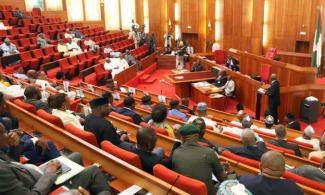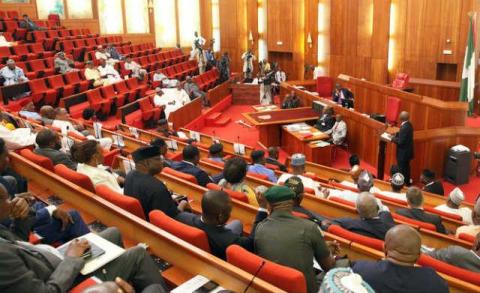
SaharaReporters last Friday reported how a court sitting in Umuahia, Abia State, ordered the Office of the Attorney-General of the Federation to immediately delete Section 84 (12) of the Amended New Electoral Act.
The Senate says it will appeal a judgment by a Federal High Court in Umuahia, nullifying the provision of Section 84 (12) of the Electoral Act 2022.
SaharaReporters last Friday reported how a court sitting in Umuahia, Abia State, ordered the Office of the Attorney-General of the Federation to immediately delete Section 84 (12) of the Amended New Electoral Act.

The court in a judgment delivered by Justice Evelyn Anyadike held that the section was unconstitutional, invalid, illegal, null, void and of no effect whatsoever and cannot stand as it violates the clear provisions of the Constitution.
In the suit marked FHC/UM/CS/26/2022, Justice Anyadike held that Sections 66(1)(f), 107(1)(f), 137(1)(f) and 182(1)(f) of the 1999 Constitution already stipulated that appointees of government seeking to contest elections were only to resign at least 30 days to the date of the election and that any other law that mandated such appointees to resign or leave the office at any time before that was unconstitutional, invalid, illegal null and void to the extent of its inconsistency to the clear provisions of the Constitution.
Last Wednesday, the AGF, Malami said following the Senate’s refusal to remove the section from the Electoral Act, the Nigerian government would consider all other options available to it before a position will be taken.
Two days later, Friday, the court sitting in Umuahia ordered the Office of the Attorney-General of the Federation to immediately delete the section of the Amended Electoral Act.
But reacting in a statement issued by Dr. Ezrel Tabiowo, Special Assistant (Press) to the Senate President, the red chamber noted that the judgement will be appealed.
The resolution was reached during plenary on Wednesday, following the consideration of a motion entitled, “Urgent need to appeal the Judgment of the Federal High Court Umuahia on Suit No.: FHC/UM/CS/26/2022 on Section 84(12) of the Electoral Act 2022.”
The motion was sponsored by Senator George Thompson Sekibo (Rivers East) and co-sponsored by 79 other Senators.
Sekibo, in his presentation, argued that in furtherance of the powers vested in the National Assembly, the 1999 Constitution under the roles of the Executive in Item D that deals with political parties in Section 228(a)(b) and (c), confers more powers on the National Assembly, more particularly on political parties and effective management of the electoral process by the Independent National Electoral Commission (INEC).
He noted that the Electoral Act 2022 enacted by the National Assembly followed due process, adding that Section 84(12) of the Act exclusively refers to nomination conventions and congresses called for candidate selection and not a participation in the general election which Sections 66(1)(f),137(1)(g) and 182(1)(g) referred to.
According to him, the interpretation of the meaning of the words ‘civil service’ and ‘public service’ in Section 318 was unambiguous, saying, “there’s a difference between the civil service or public service and political appointment.”
He added, “The Senate of the Federal Republic of Nigeria should show concern on the judgment, especially when she was not given opportunity to represent herself in a matter such as this that emanates from her legitimate functions.”
Sekibo warned further that, “letting the judgment go without concern will become a precedence on which any person could go to court and obtain a judgment to ridicule the good intentions of the National Assembly as an institution.”
The Senate, accordingly, resolved to appeal the judgment in suit FHC/MU/SC/26/2022 for the court to set aside the judgment, noting that same was reached without due consideration of the Constitutional interpretation in Section 318 of the 1999 Constitution as amended.
While signing the Electoral Bill into law last month, President Buhari had asked the National Assembly to delete section 84 (12), which restricts sitting cabinet members from contesting for elective offices without resigning.
For instance, with the provisions of the act, political appointees such as Rotimi Amaechi, Minister of Transportation; Malami, Minister of Justice; Chris Ngige, Minister of Labour and Employment; Emeka Nwajiuba, Minister of State for Education; Godswill Akpabio, Minister of Niger Delta Affairs; Timipre Sylva, Minister of State for Petroleum Resources, among others who have been reportedly linked to presidential and governorship ambitions must resign from their various offices if they want to contest in 2023.
The section reads: “No political appointee at any level shall be a voting delegate or be voted for at the convention or congress of any political party for the purpose of the nomination of candidates for any election.”
Malami is interested in becoming the next Kebbi governor; Nwajiuba is being projected by the Project Nigeria Group (PNG) for the presidency; Ngige says he is consulting on running for president; Akpabio has also received the backing of the Godswill Akpabio Uncommon Transformational Support Organisation (GAUTSO) to contest for political office, and the Southern Mandate Group and Chibuike Amaechi Crusaders 2023 want the transportation minister to succeed Buhari.